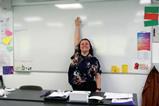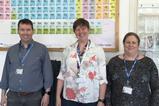Qualitative study reveals causes of shortages and suggests steps to the address them

Against a backdrop of persistent teacher shortages and a lack of rigorous research, Emily MacLeod undertook a PhD at the UCL Institute of Education, funded by the Economic and Social Research Council and co-funded by the Royal Society of Chemistry (RSC). The qualitatively-led thesis is the first known study of young people’s trajectories towards and away from becoming a teacher.
In her study, ‘The status and safety of teaching: A longitudinal study of why some young people in England become teachers, and why others do not,’ Emily took an innovative approach to understanding teacher supply by tracking the teaching pathways of young people over an 11-year period. She used primary and secondary data from the ASPIRES research project to do so. Emily submitted her thesis in June 2023 and successfully passed the Viva in October 2023.
36% of the young people surveyed were open to becoming a teacher
The central focus of Emily’s research was to understand why there are severe and long-term teacher shortages in England, with a particular emphasis on science education. Unlike previous studies that primarily focused on the motivations of individuals who choose to teach, Emily’s research aimed to uncover why some young people opt not to pursue a career in teaching. In her study, she asked crucial questions about aspirations toward teaching, the factors influencing these aspirations, and why some individuals deviate from their initial interest in becoming a teacher, especially in science.
Education policy programme manager at the RSC, Annette Farrell, was Emily’s industry placement supervisor, supporting her through her PhD. She says Emily’s findings shed a ‘fascinating light on young people’s career aspirations with regard to teaching’. Annette shares that Emily’s recommendations for more careers education about teaching and how to become a teacher across secondary, further and higher education are of particular interest to the RSC. ‘I think there can be a tendency for people to assume that everyone knows how to become a teacher, but Emily’s research has shown that this is simply not the case,’ she concludes.
A vocational choice
Emily’s quantitative analyses revealed that 36% of the young people surveyed between ages 10/11 and 21/22 were open to becoming a teacher. However, the findings indicate that teaching is often considered as a ‘back-up’ rather than a first-choice career aspiration.
The study also highlighted that the choice of becoming a teacher is not a single decision but an ongoing series of identity negotiations. Participants frequently wavered between wanting to pursue teaching and other career options.
Many of those who became teachers called it their ‘vocation’, suggesting that they believed they were meant to teach. All participants who identified teaching as their ‘vocation’ were White women.
Participants who did not choose to become teachers did not perceive it as a highly-skilled or highly-educated profession, but rather as an easy-to-access career that does not require a high level of education. This challenges the common assumption that addressing recruitment and retention issues in teaching can be approached with combined strategies.
Shaping future policy
Emily concludes her thesis by recommending targeted, long-term careers education. She reasons that this should emphasise the professional nature of Initial Teacher Education as well as dispelling misconceptions about teaching as an innate skill.
Emily’s groundbreaking research not only pinpoints the complexities of teacher shortages but also provides valuable insights for shaping future recruitment and retention policies in England.
More insights on science teacher recruitment and retention
- Learn about the findings from our 2023 Science Teaching Survey.
- Read Emily’s article on why we need to make teaching a first-choice career.






















No comments yet